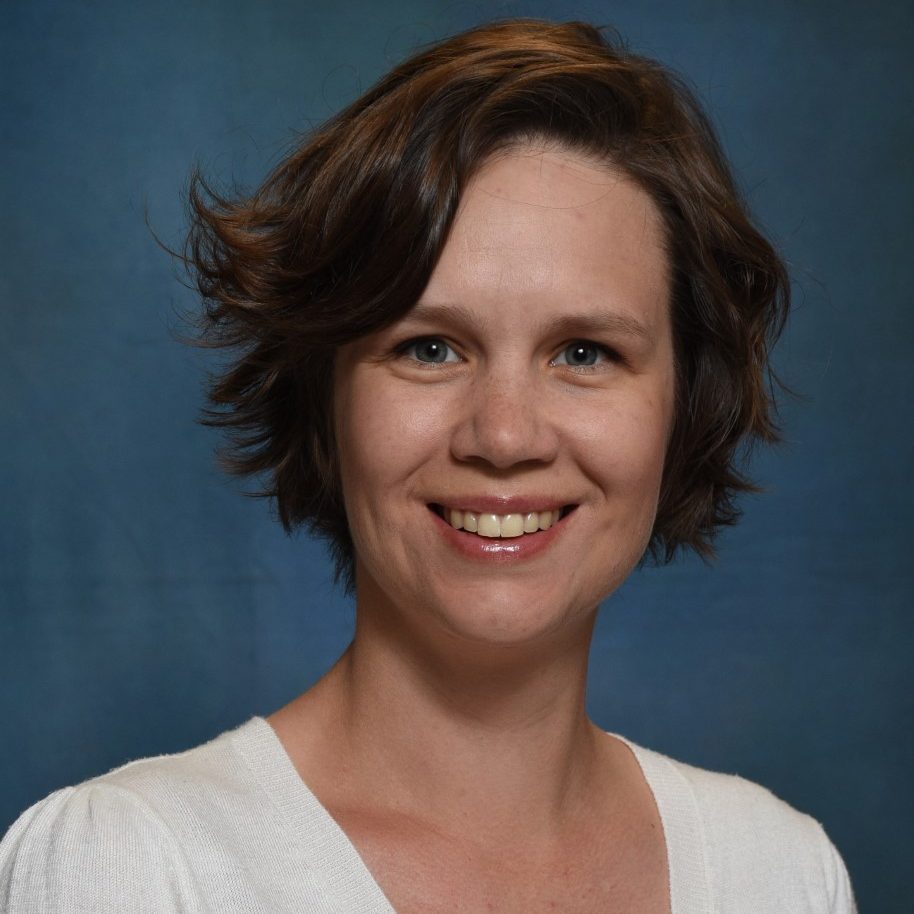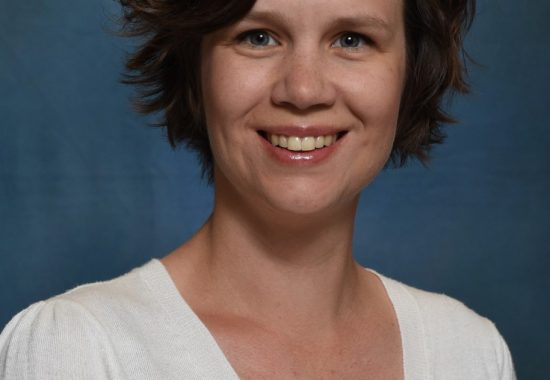
MRRI provides exceptional training opportunities for early-career scientists through a postdoctoral research program funded by a National Institutes of Health T32 training grant in translational neurorehabilitation research. Marja-Liisa Mailend, Ph.D., is one of those scientists who recently completed her postdoctoral fellowship position at MRRI. We chatted with her to discuss her career, research, and experiences during her time at MRRI.
1) Can you tell us more about your current position and where you are now?
I am currently in a transition phase as my husband and I work to synchronize the next steps of our careers. Both of us are pursuing academic careers. It does not mean that I am bored – quite the opposite. I am continuing my research at MRRI on several projects and have started an exciting new collaboration with the Department of Speech and Hearing Sciences at the University of North Carolina.
2) How did you first get interested in rehabilitation research?
My undergraduate and Master’s degrees are in speech-language pathology. My interest in rehabilitation research came directly from realizing, through my studies and clinical placements, that there is a great need for a solid scientific basis for clinical work. I also discovered that I greatly enjoy the process of scientific thinking and conducting research.
3) Can you describe your academic background and the steps that led you to your fellowship at MRRI?
Deciding what to study after high school was hard for me. I knew that I wanted to continue my studies at a university, but considered vastly different fields from chemistry to psychology. Ultimately, I decided to pursue speech-language pathology and special education. The curriculum appealed to me because of its interdisciplinary nature; it covered subjects from philosophy and linguistics to anatomy and physiology. My young self also was hoping to become involved in a career that could make a difference in people’s lives. Speech-language pathology checked all the boxes.
The idea of pursuing research and doctoral studies never crossed my mind until suddenly it seemed like the most logical next step. In Estonia, where I completed my Bachelor’s and Master’s degrees, the final requirement for both of these degrees was a thesis. After completing my Bachelor’s thesis, I realized that working on my thesis had been the most exciting experience in my undergraduate studies. Discussing this with my advisor, he invited me to join a large research project. I was the youngest and the least experienced person on the team and, thus, had the most to learn. I worked on that project in parallel with my Master’s studies. After graduating, it was clear to me that I wanted to pursue a research career and needed to find a Ph.D. program to acquire the necessary knowledge and skills.
It is a complicated story that eventually led me from my little Northern home country of Estonia to the University of Arizona (UofA) located in the sunny and wonderful Sonoran Desert. The story does involve the world-class reputation of the Department of Speech, Language, and Hearing Sciences at UofA, excellent potential mentors, the love of my life for 14 years and counting, and probably a good amount of luck. I had the opportunity to work with and be mentored by some amazing scientists at UofA who effortlessly solidified my career choice and continue to inspire me today.
4) Why did you choose to conduct postdoctoral research at MRRI?
So many reasons drew me here: the outstanding and highly impactful aphasia research developed at MRRI, exceptional mentors, interest in experiencing a different setting apart from a university, integration with a world-class rehabilitation hospital at MossRehab, excellent resources (particularly in terms of participant recruitment, which can be a major obstacle in my line of work), and so much more.
5) What experiences or skills from your fellowship at MRRI do you think will be most important in your career going forward?
This is a difficult question. I have gained a very rich experience for launching the career in rehabilitation research that I want to pursue. I learned a lot, from the nuts and bolts of conducting rehabilitation research to the big picture issues in the field, which—as anyone in MRRI is ready to explain—is interestingly unique and different from its better-known cousin, pharmacological research. I have many more friends and colleagues within my profession compared to three years ago, when I started here, and I have been a part of the everyday life of two successful labs within a successful research institute. All sorts of skills and ideas seep through one’s clothes through active participation in an environment such as this.
6) What did you enjoy most about working at MRRI?
I enjoy the focus and collective enthusiasm for rehabilitation research. MRRI has a very collegial yet stimulating environment for research. The institute is filled with people who can, and happily do, sink their teeth into any rehabilitation research question. This pertains not only to scientists but to other staff members, such as clinicians and research assistants. The competence and enthusiasm of my colleagues make for very lively meetings and talks at MRRI. These experiences prepare you for whatever may come once outside the institute’s walls. At MRRI, many problems are solved informally simply by wandering into the kitchenette and talking to whoever is brewing their coffee or waiting for the microwave to announce lunch-time. In addition to the scientific community, it is the very capable administrative staff who make work at MRRI so enjoyable. The administrative staff typically addresses your problems before those problems even take shape. This supportive yet stimulating environment makes a difference because it is easy to feel lonely and stressed in this demanding line of work.
7) What was one of your most memorable moments at MRRI?
Quite a selection of moments rushes into my mind. One of them is seeing my first participant with aphasia in the first experiment that I set up at MRRI. I work on a phenomenon called speech entrainment, which refers to the act of speaking in synchrony with another person. Typical speakers are extremely good at performing this task. Remarkably, some people with aphasia, whose independent speech is very limited, also can produce much more speech under speech entrainment. It was fascinating to witness that phenomenon for the first time in person.
8) What is something you are working on now that you are really excited about?
Most of my career so far has focused on understanding acquired neurogenic communication disorders such as aphasia and apraxia of speech. The long-term goal is to find better, more effective ways to remediate aphasia and apraxia of speech. At MRRI, I have been able to take the next step towards this goal. My current study explores the possibility of using speech entrainment—the phenomenon previously described —to help people with aphasia and/or apraxia of speech improve their independent speech. We now know that speech entrainment helps many people with aphasia to produce more speech. Now, we want to know if practicing with entrainment will help them speak independently after practice when the entrainment support is removed.
9) Can you share some of the key findings from your research and the impacts your work may have on rehabilitation?
One key finding from my research is with the underlying mechanism of apraxia of speech – a speech disorder that affects the planning of speech movements. Speaking is an incredibly complex skill that involves many levels of processing from forming a thought to precisely-timed muscle contractions in the systems for articulation, phonation, and breath support. My research is focused on the operations that translate a verbal idea in a speaker’s mind into the physical movements that ultimately produce speech. Currently, we assume that this task is achieved via planning chunks called motor programs. Rather than planning each muscle contraction separately, we plan larger units that may correspond, for example, to a syllable in a person’s speech. My research has shown that while motor programs are largely intact in people with apraxia of speech and aphasia, the process of accessing them is impaired. This finding is important clinically because most current treatment approaches explicitly or implicitly assume that the motor programs are not intact in apraxia of speech and must be reestablished in the context of treatment. My research suggests that effective treatments should focus instead or in addition to the process of accessing and selecting the intended motor programs. The next question is how that can be achieved in a treatment context.
10) Can you tell us about some of your interests or hobbies outside of your research? These days I spend quite a bit of time playing in the sandbox, throwing little rocks in the stream, singing made-up songs, and collecting acorns – I am a mother to a two-year-old. I have also collected True American Experiences for quite some time. More recently, I have become a circular economy enthusiast, that is, I am fascinated with the ideas that envision our economy and everyday lives.


2 comment on “Catching Up with Former MRRI Postdoc Marja-Liisa Mailend”